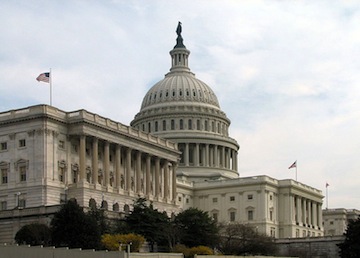House Bill Would Make Streamers, Others Pay Into Broadband Subsidy Fund
FCC asked to consider expanding contributions to Big Tech

The smarter way to stay on top of the multichannel video marketplace. Sign up below.
You are now subscribed
Your newsletter sign-up was successful
Among a laundry list of Republican House bills targeted at edge providers introduced this week was a House version that would require the Federal Communications Commission to study the feasibility of making streaming services and others pay into the Universal Service Fund (USF) subsidy program.
The FCC-overseen USF provides billions of dollars to subsidize advanced telecommunications for low-income areas, schools and libraries, health care facilities and/or high-cost areas where there is an insufficient business case for private buildouts.
At present, it is paid into by telecom providers, which pass along the fee to their customers.
The Senate version was introduced last week by Republican Sens. Roger Wicker of Mississippi, ranking member of the Senate Commerce Committee; Shelley Moore Capito of West Virginia; and Todd Young of Indiana.
Also Read: Groups Call For USF Fees on Broadband Providers
The Funding Affordable Internet with Reliable [or FAIR] Contributions Act would ask the FCC to consider making “a search engine, a social media platform, a streaming service, an app store, a cloud computing service, or an e-commerce platform” pay into the fund.
The FCC would be asked to assess which sources of revenue to tap, including digital advertising and user fees, and assess the the current cost burden of USF on those who purchase legacy telecommunications services. Broadband providers, which are currently classified as information rather than telecommunications services, do not pay into the fund.
The FCC is also asked to consider whether the USF fund should be phased out once advanced telecommunications is universally available.
The House version of the bill was spearheaded by Republican Rep. Markwayne Mullin of Oklahoma. The report to Congress would be due six months after the date of enactment.
FCC Republican commissioner Brendan Carr, a vocal critic of Big Tech, supports making edge providers pay into USF.
“Big Tech derives extraordinary value from the use of these high-speed networks,” he said in a statement on the package of tech-targeted bills. “Requiring them to start contributing a fair share into the Universal Service Fund would promote Internet builds in rural areas and other efforts to close the digital divide.”
The smarter way to stay on top of the multichannel video marketplace. Sign up below.
Contributing editor John Eggerton has been an editor and/or writer on media regulation, legislation and policy for over four decades, including covering the FCC, FTC, Congress, the major media trade associations, and the federal courts. In addition to Multichannel News and Broadcasting + Cable, his work has appeared in Radio World, TV Technology, TV Fax, This Week in Consumer Electronics, Variety and the Encyclopedia Britannica.

